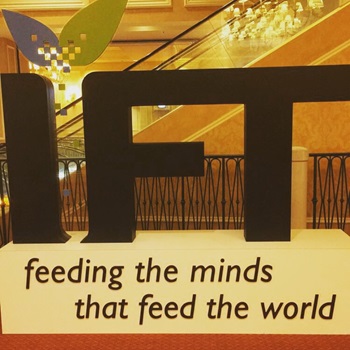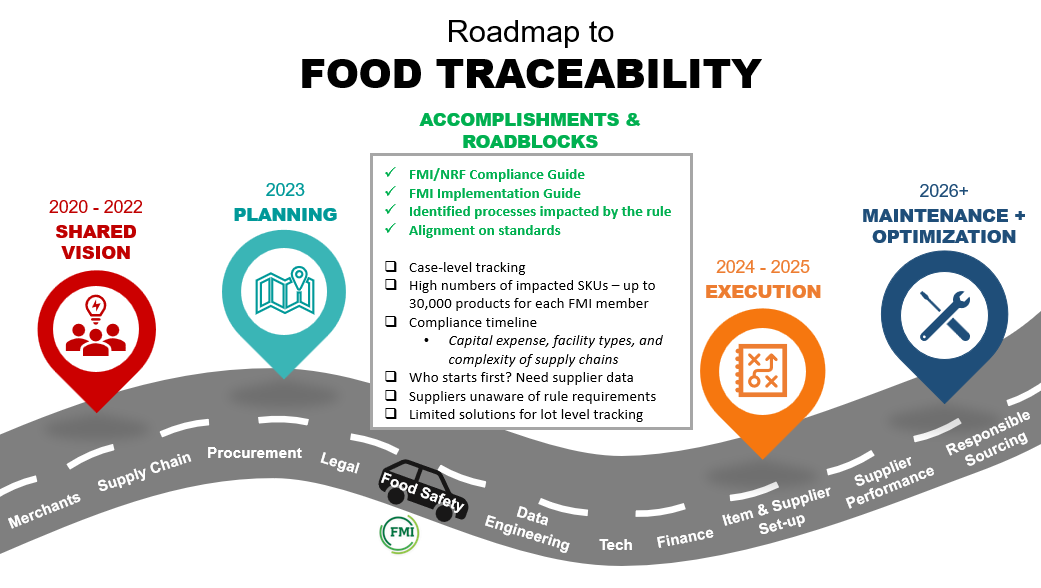By: Adam Friedlander, Specialist, Food Safety and Technical Services, Food Marketing Institute

The Institute of Food Technologists (IFT) held the 2017 Annual Meeting and Food Expo in Las Vegas, Nevada from June 25-28, 2017. Industry experts, students and government officials from over 90 countries converged in the scorching 115°F valley to share evidence-based scientific knowledge, in order to safely, sustainability, and nutritiously feed a rising human population.
The main event for this year’s meeting was the premiere of the 2017 documentary, “Food Evolution” directed by Emmy-award winning director, Scott Hamilton Kennedy and narrated by Dr. Neil deGrasse Tyson. This film was funded entirely by Feeding Tomorrow, The Foundation of IFT, but it is important to note that the director had complete creative control over the film’s content.
The subject matter of the scientific sessions during the IFT Annual Meeting revolved around the main themes of “Food Evolution.” In a session titled Research Integrity in Industry-Funded Nutrition Research: Challenges and Recommendations, Dr. Eric Hentges, executive director of the International Life Sciences Institute (ILSI) stated, “Scientific quality and excellence is the issue, not the funding.” To ensure funding organizations are not collecting data or inappropriately influencing research outcomes, each peer-reviewed publication impacting public health is scored on the quality of evidence and the strength of recommendations by the World Health Organization’s (WHO) GRADE handbook. While this film wasn’t graded by the WHO, “Food Evolution” was produced with the intent to provide primary resources from peer-reviewed publications in defense of biotechnological advancement.
One of the main themes of “Food Evolution” was a call for scientists to more clearly and effectively communicate scientific results to the public, specifically modern forms of genetic breeding that can improve global public health and sustainability efforts. In the panel discussion From CRISPR to Syn Bio: How to Explain the Benefits and Safety of the Latest Food and Agriculture Technologies to the Public, Dr. Christine Bruhn, professor emeritus at UC Davis illustrated how the lack of communication highlighting positive aspects of new technologies, such as genetic engineering and food irradiation, created an opportunity for non-scientists to undermine scientific consensus from the world’s leading public health organizations by making false claims about the nutrition and safety of these food products through various media platforms (Twitter, Facebook, Google, etc.). When subject-matter experts proactively and transparently create dialogue with consumers to emphasize beneficial attributes of modern agricultural technologies, while addressing fears and concerns, the consumer is in a better position to make more informed purchasing decisions in retail.
Overall, the scientific sessions at this year’s IFT conference emphasized the importance of evidence-based communication as a means to empower future generation’s knowledge of how our global food system works. The human population will reach 9.6 billion by 2050, according to a 2012 report by the United Nations Department of Economic and Social Affairs (UN-DESA). As demand for nutritious and safe foods increase, it remains essential to promote sustainable agricultural technologies which feed our growing population.
“If those who know don’t communicate, those who don’t know will.” – Dr. Christine Bruhn, UC Davis

 Industry Topics address your specific area of expertise with resources, reports, events and more.
Industry Topics address your specific area of expertise with resources, reports, events and more.
 Our Research covers consumer behavior and retail operation benchmarks so you can make informed business decisions.
Our Research covers consumer behavior and retail operation benchmarks so you can make informed business decisions.
 Events and Education including online and in-person help you advance your food retail career.
Events and Education including online and in-person help you advance your food retail career.
 Food Safety training, resources and guidance that help you create a company food safety culture.
Food Safety training, resources and guidance that help you create a company food safety culture.
 Government Affairs work — federal and state — on the latest food industry policy, regulatory and legislative issues.
Government Affairs work — federal and state — on the latest food industry policy, regulatory and legislative issues.
 Get Involved. From industry awards to newsletters and committees, these resources help you take advantage of your membership.
Get Involved. From industry awards to newsletters and committees, these resources help you take advantage of your membership.
 Best practices, guidance documents, infographics, signage and more for the food industry on the COVID-19 pandemic.
Best practices, guidance documents, infographics, signage and more for the food industry on the COVID-19 pandemic.
